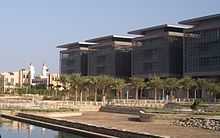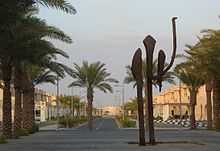King Abdullah University of Science and Technology
| King Abdullah University of Science and Technology | |
|---|---|
| جامعة الملك عبد الله للعلوم والتقنية | |
 | |
| Motto | "Through Inspiration, Discovery" |
| Established | 5 September 2009 |
| Type | Public |
| Endowment | US$20 billion[1] |
| President | Jean-Lou Chameau |
| Undergraduates | None |
| Postgraduates | 1200[2] |
| Location |
Thuwal, Makkah Province, Saudi Arabia Coordinates: 22°18′45″N 39°06′38″E / 22.312602°N 39.11047°E |
| Campus | 3,600 hectares (8,900 acres) |
| Colours | Green, yellow, orange, blue |
| Website | www.kaust.edu.sa |
King Abdullah University of Science and Technology (KAUST) (Arabic: جامعة الملك عبد الله للعلوم و التقنية - كاوست jāmiʿat al-malik ʿabd al-Lāh li-l-ʿulūm wa-t-teqniyya – KAUST) is a public research university located in Thuwal, Saudi Arabia.
KAUST was founded in 2009 and focuses exclusively on graduate education and research, using English as the official language of instruction. It offers programs in Biological and Environmental Sciences and Engineering; Computer, Electrical, and Mathematical Sciences and Engineering; and Physical Sciences and Engineering. It was recently announced that KAUST has one of the fastest growing research and citation records in the world right now.[3]
History
KAUST officially opened on 23 September 2009, in Thuwal, Saudi Arabia. King Abdullah Bin Abdulaziz Al Saud invited more than 3,000 distinguished Saudi and international guests, including heads of state and Nobel laureates, to join him for the KAUST inauguration ceremony on Saudi National Day. During the inauguration, King Abdullah awarded the senior management staff the highest rank of King Abdulaziz's medal of honor and appreciation, the minister of petroleum getting the platinum.
The university launched an inauguration website to allow people from around the world to participate in the event. This website featured a live event webcast, and information about the university's research agenda, lab facilities, faculty, students, and community.[4]
Campus


KAUST’s core campus, located on the Red Sea at Thuwal, is sited on more than 36 square kilometres (14 sq mi), encompassing a marine sanctuary and research facility.[5]
KAUST is the first mixed-gender university campus in Saudi Arabia. Saudi authorities hope the mixed-gender center will help modernize the kingdom's deeply conservative society.[6] The religious police do not operate on-site. Women are allowed to mix freely with men and to drive on campus, and they are not required to wear veils in the coeducational classes.[7]
KAUST was Saudi Arabia's first LEED certified project and is the world's largest LEED Platinum campus.[8] Designed by international architecture firm HOK, it was also chosen by the American Institute of Architects (AIA) Committee on the Environment (COTE) as one of the 2010 Top Ten Green Projects.[9] The University Library received the 2011 AIA/ALA Library Building Award for distinguished accomplishments in library architecture. [10]
Laboratories
Research institutions in the Kingdom and the region will link to the university’s supercomputer and other laboratory facilities through the 10 gigabits per second (Gbps) Saudi Arabian Advanced Research and Education Network (SAREN).[11]
- Supercomputer: Shaheen—the Arabian word for peregrine falcon—is the fastest supercomputer in the Middle East and one of the most powerful in the world. Developed by IBM, it is capable of 222 teraflops, or 222 trillion floating point operations per second.
- Visualization: CORNEA is a fully immersive, six-sided virtual reality facility that gives students and researchers the ability to turn data into 3D structures that they can interact with and examine. It was built in partnership with the University of California, San Diego.
- Nanofabrication, Imaging, and Characterization: A clean-room environment equipped with tools to support research in advanced materials, biotechnology, electronics and photonics, and MEMS/NEMS. The Imaging and Characterization Labs include a suite of 10 nuclear magnetic resonance (NMR) spectrometers and facilities for scanning, transmission, confocal, and Raman Spectroscopy, magnetic and thermal measurements, allowing scientists to examine nanostructure devices and surfaces down to the level of individual atoms.
- Coastal and Marine Resources: Located next to the Red Sea, the Coastal and Marine Resources Lab facilitates marine research. The facility builds and deploys oceanographic instrumentation and provides operational services to support research vessels for marine exploration, diving, and sampling. Indoor and outdoor seawater facilities allow researchers to culture marine organisms.
- Analytical Core: These labs focus on spectroscopy, chromatography and mass spectrometry, trace metals analysis, wet chemistry, and surface analysis.
- Biosciences and Bioengineering: These facilities include genomic and proteomic labs essential to the study of cellular molecules for DNA sequencing and genetic analysis, as well as the investigation of cellular processes. The genomics facility is equipped with robots and laboratory automation.[11]
Residential Neighborhoods
KAUST students, faculty and staff live in one of three residential areas: Safaa Gardens, Harbor District and Safaa Island neighborhood. Hubs of community activity, include Discovery Square, multiple gym facilities, libraries, and coffee shops. Discovery Square features a movie theater, a grocery store, and several restaurants (offering, American fast food, Indian food, Pizza and Ice cream). The gym facilities include exercise equipment, free weights, racquet sports, bowling, and rock climbing.
Academics and research
University organizes interdisciplinary collaborative research teams across three academic divisions Biological and Environmental Sciences and Engineering (BESE); Computer, Electrical, and Mathematical Sciences and Engineering (CEMSE); and Physical Sciences and Engineering (PSE). It offers two graduate programs: a Master of Science degree (18 months) and a Ph.D. program (3–4 years).[12]
Degrees are offered in 12 fields of study:
CEMSE offers academic tracks in:
- Applied Mathematics and Computational Science (AMCS)
- Computer Science (CS)
- Electrical Engineering (EE)
BESE offers academic tracks in:
- Bioscience (B)
- Environmental Science and Engineering (EnSE)
- Marine Science (MarS)
- Plant Science
PSE offers academic tracks in:
- Chemical Science (ChemS)
- Chemical and Biological Engineering (CBE)
- Earth Science and Engineering (ErSE)
- Materials Science and Engineering (MSE)
- Mechanical Engineering (ME)
KAUST focuses on research that applies science and technology to problems of human need, social advancement, and economic development.[11] Four strategic research thrusts build KAUST’s research agenda: Resources, Energy and Environment; Biosciences and Bioengineering; Materials Science and Engineering; Applied Mathematics and Computational Science.[11]
To support these thrusts, KAUST established multidisciplinary Research Centers focused on catalysis, clean combustion, computational bioscience, geometric modeling and scientific visualization, membranes, desert agriculture, Red Sea science and engineering, solar and alternative energy science and engineering, and water desalination and reuse.[11]
Admissions
GRE scores are not mandatory for admission. Since the language of instruction at KAUST is English, a minimum TOEFL score of 79 is required for admission.
Organization and administration
The first president of the university was Choon Fong Shih.[13] On 16 February 2013, the executive committee of the board of trustees at KAUST appointed Jean-Lou Chameau, the former president of California Institute of Technology, as the new President of KAUST.[14]
KAUST has established various self-directed organizations. Its graduate student council was established in 2009, for voicing students interests. Under the council there are four subcommittees: Academic and Research Committee, Graduate Life Committee, International Business Relations Committee and University Relations Committee.[15]
Students
KAUST has between 700 and 1000 students. The PhD student population is growing steadily as of 2011. The student population comes from over 60 nationalities from all continents. The largest single national representation is from China with India in second place. Saudi Arabia is the third most prevalent nationality of the student make up.
Building Design Information
- Size: 4 million square feet; 2.1 million square foot laboratory; 5.2 million square foot campus
- Owner: Aramco, Dhahran, Saudi Arabia
- Architect, Lab Planner, Lead MEP Engineer, Interiors: HOK
- Architect of Record: Oger International, Paris
- MEP (Fire Protection): R.G. Vanderweil Engineers, Boston
- MEP (Energy Modeling): Affiliated Engineers Inc., Seattle
- Structural Engineer: HOK and Walter P. Moore, Houston
- Environmental Consultant: RWDI, Guelph, Ontario, Canada
- Civil Engineer: LJA Engineering, Houston
- Landscape Architect: HOK Planning Group, Atlanta
- Lighting Design and Consulting: HOK and Pivotal Lighting Design, Seattle
Awarded Lab of the Year for 2011 by R&D Magazine http://www.rdmag.com/news/2011/03/new-beginnings-2011-laboratory-year-winners
References
- ↑ Sciencemag
- ↑ http://www.timeshighereducation.co.uk/420231.article
- ↑ http://www.al-fanarmedia.org/2013/10/how-saudi-universities-rose-in-the-global-rankings
- ↑ "KAUST Inauguration Ceremony Looping Feed". King Abdullah University of Science and Technology.
- ↑ "KAUST general FAQs". King Abdullah University of Science and Technology. Retrieved 2 October 2009.
- ↑ Slackman, Michael (18 November 2009). "A Saudi Gamble to See if Seeds of Change Will Grow". The New York Times. Retrieved 3 April 2013.
- ↑ BBC - Saudis open hi-tech science oasis
- ↑ World's largest LEED-Platinum project finds place in Top Ten Green Projects
- ↑ AIA’s Top Ten Green Architecture Projects of 2010
- ↑ KAUST Library - 2011 AIA / ALA Library Building Awards
- ↑ 11.0 11.1 11.2 11.3 11.4 "KAUST Research". King Abdullah University of Science and Technology.
- ↑ "KAUST Academics". King Abdullah University of Science and Technology.
- ↑ Selingo, Jeff (22 April 2011). "Saudi Arabia’s Elite New University Pursues ‘High-Risk Research for a High Return’". The Chronicle. Retrieved 3 April 2013.
- ↑ "KAUST appoints new president". Asharq Alawsat. 21 February 2013. Retrieved 3 July 2013.
- ↑ http://www.kaust.edu.sa/student_services/graduateservices/council.html?submenuheader=0